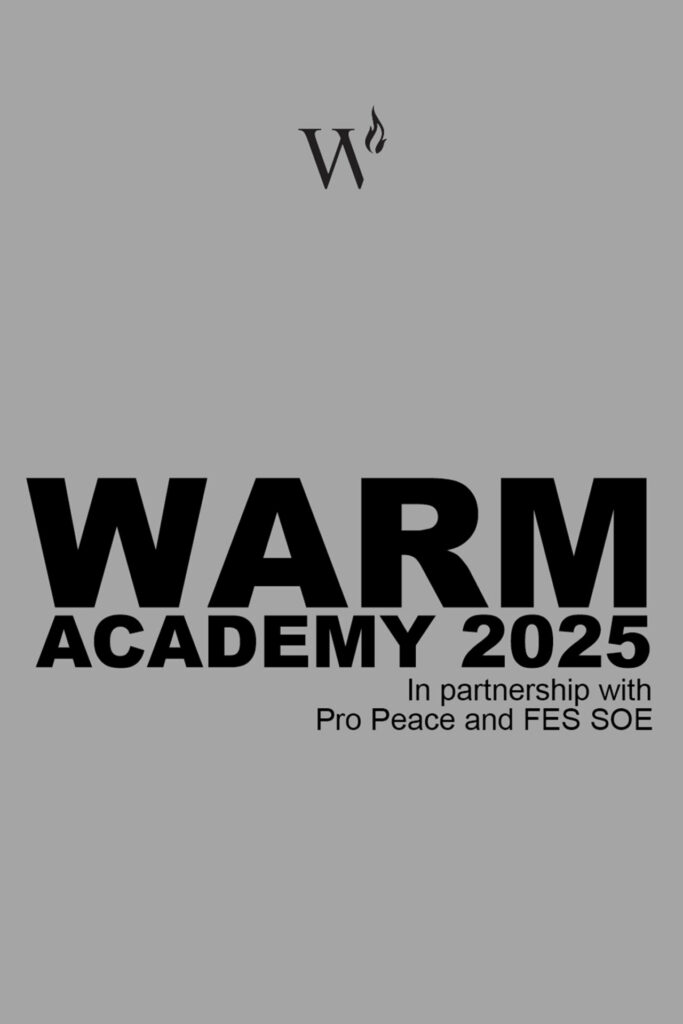
WARM Academy 2025
July 7-12
Venue: The European House of Culture and National Minorities
(unless otherwise stated)
Note: Some events are open to the public and will be announced in advance.
The WARM Academy 2025 brings together leading journalists, photographers, filmmakers, researchers, and artists for a week of lectures, masterclasses, and critical discussion. Through real-world experience and interdisciplinary exchange, this unique educational program offers selected participants the opportunity to deepen their understanding of contemporary conflict and post-conflict transitions.
Closely integrated with the WARM Festival, the Academy allows participants to engage not only with dedicated educational sessions but also with the broader festival program—films, exhibitions, debates, and public events—creating a rich and immersive experience.
This year’s Academy features the following speakers and sessions:
Fabio Bucciarelli (Masterclass)
Lecture: Occupied Territories: Visual Testimony from the Frontlines
Fabio presents his new book and years-long photographic work in Palestine, examining the role of photojournalism in bearing witness and challenging dominant narratives.
Laura Boushnak (in conversation with Damir Šagolj – Masterclass)
Lecture: An Arab World: The Vision of Laura Boushnak
Laura discusses her long-term project documenting women’s education and empowerment across the Arab world. Through a combination of photography and testimony, she highlights resilience in restrictive environments.
Mélissa Cornet & Kiana Hayeri
Lecture: No Woman’s Land – Afghan Women’s Unfinished Fight
Mélissa and Kiana reflect on their joint project documenting life for women in Afghanistan under Taliban rule, using research, imagery, and testimony to give voice to silenced experiences.
Bette Dam
Lecture: What if journalism isn’t broken—but built to exclude?
In this interactive session, Bette proposes a rethinking of the editorial system, imagining a more inclusive newsroom from the ground up.
Bojan Hadžihalilović
Lecture: The Power of Design in Wartime and Peace
Bojan explores how design served as resistance and identity during Sarajevo’s siege, and how visual culture continues to shape memory and survival.
Pierre Hazan
Lecture: Negotiating with the Devil: Justice vs. Peace in Mediation
Pierre examines the moral and political complexities of conflict mediation, questioning the limits of transitional justice in real-world negotiations.
Carol Isoux
Lecture: Myanmar’s Hidden War: Youth Resistance, Ethnic Struggles, Organized Mafias and Undercover Reporting
Carol provides a rare insider’s view of Myanmar’s underreported war, exploring how underground journalism can expose hidden dynamics of power and resistance.
Mišo Kapetanović
Lecture: The Underdog’s Voice: Navigating Bias, Data Ethics, and Motivation in Post-War Zones
Mišo offers tools for trauma-informed journalism while navigating the challenges of data ethics and bias in conflict and post-conflict reporting.
Andrew R.C. Marshall (Masterclass)
Lecture: Dirty Data, Clean Case
Andrew shares how a passing comment and messy data led to a prize-winning investigation into police killings in the Philippines, revealing the investigative process behind the headlines.
Anne Poiret
Lecture: What Happens When the War is “Over”?
Anne discusses her decade-long reporting on post-war zones and introduces AFTER WAR, a project dedicated to documenting reconstruction, memory, and justice beyond the battlefield.
Olivier Sarbil (in conversation with Danis Tanović – Masterclass)
Lecture: Bearing Witness: Fiction and Documentary in War Cinema
Following the screening of VIKTOR, Olivier and Oscar-winning director Danis Tanović reflect on the power and responsibility of storytelling in times of war.
Annie Slemrod
Lecture: The Politics of Aid: Reporting on Humanitarian Failures
Annie dissects humanitarian operations in Yemen and Gaza, revealing how aid systems often reflect the power structures they aim to oppose.
Pascal Vannier
Lecture: Reporting from D-Day to Today: A Journalist’s Reflection
Pascal presents The Other Landing, a film honoring the war correspondents of WWII. He draws connections between their legacy and today’s conflict reporting, while previewing his next documentary project.